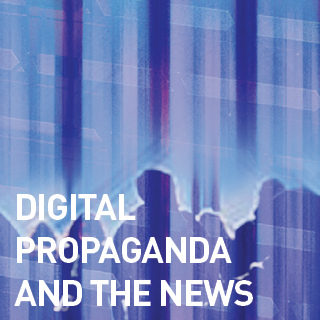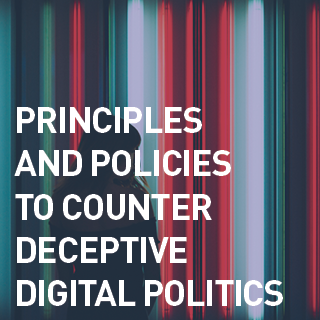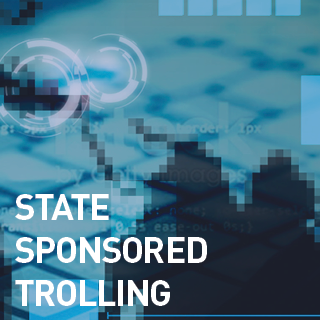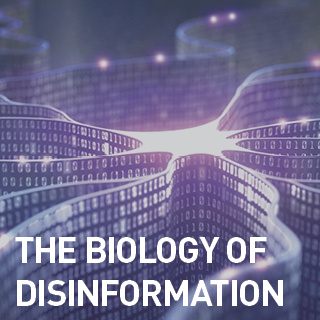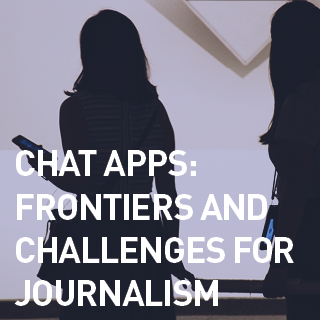Digital Intelligence Lab

Digital Intelligence Lab
The Digital Intelligence Laboratory at the Institute for the Future is a social scientific research entity conducting work on the most pressing issues at the intersection of technology and society. We examine how new technologies and media can be used to both benefit, and challenge, democratic communication.
Our team of researchers and fellows works at the cutting edge of online propaganda. We use qualitative and quantitative methods to study the broader flow of socio-political information on and offline.
We report on the ways that social media bots—automated profiles on platforms like Facebook or Youtube that look and communicate like real people—have been used to manipulate public opinion during key political events. We also study how tools like bots can be used for the benefit of society. The Digital Intelligence Lab produces research and incubates cutting edge tools—both technical and social—that aim to educate and protect society in the face of such problems.
Our work is fundamentally forward facing.
We are collaborative at our core, partnering with outside researchers, civil society groups, policy makers, technology companies, democracy activists, and journalists to ensure that our findings have real-world impact.
Current collaborators include the Computational Propaganda Project at the University of Oxford to the William and Flora Hewlett Foundation.
In the Media
- "White House hosting a summit about online extremism," Katie Joseff is interviewed by Yahoo Finance's Julie Hyman and Adam Shapiro (8/8/19). Yahoo TV.
- "Social Media Platforms Need Hotlines to Report Harassment," Katie J, Sam Woolley, and Nick Monaco wrote an op-ed for Slate: Future Tense (8/2/19).
- "Should Big Tech be Accountable for their Users’ Activity?" Katie Josef is interviewed by Yahoo Finance's Adam Shapiro, Akiko Fujita, and Andy Serwer (2/21/19). Yahoo TV.
- "Computational Propaganda, Jewish-Americans and the 2018 Midterms: The Amplification of Anti-Semitic Harassment Online," (11/1/18) Anti-Defamation League Blog
- "A digital funnel drives people to commit hate crimes in real life,"(10/31/18) by Max de Haldevang. Quartz
- "SINCE TRUMP TOOK OFFICE ANTI-SEMITIC POSTS ON SOCIAL MEDIA HAVE SPIKED, RESEARCHERS SAY," (10/28/18) by RAMSEY TOUCHBERRY. Newsweek
- "How Twitter Is Cracking Down on State-Sponsored Bots," (10/23/18) Bloomberg TV, Technology
- "Say goodbye to grassroots politics. The future is made of Astroturf," (9/25/18) by Samuel C. Woolley. Quartz
- "Facebook hit with federal housing discrimination complaint," (8/17/18) by Marisa Kendall. The Mercury News
- "Politicized Trolling Is Worse Than Fake News," (7/23/18) by Leonid Bershidsky. Bloomberg
- "Homeland Security secretary sees less Russian meddling in this year's election," (7/14/18) AP. Los Angeles Times
- "The Switch: Twitter is sweeping out fake accounts like never before, putting user growth at risk," (7/6/18) by Craig Timberg and Elizabeth Dwoskin. Washington Post
- "In Mexico, fake news creators up their game ahead of election," (6/28/18) by Julia Love, Joseph Menn, David Ingram. Reuters
- "Memes Are For Tricksters: The Biology of Disinformation," (6/21/18) by "R. U. Sirius." Mondo
- "Expert: Bots are poised to wreak havoc in the 2018 midterm elections," (6/20/18) by David Knowles. Yahoo News
- "Facebook Says It Deleted 865 Million Posts, Mostly Spam," (5/15/18) by Sheera Frenkel. New York Times
- "'The Biology of Disinformation,' a paper by Rushkoff, Pescovitz, and Dunagan," (4/30/18) by David Pescovitz. Boing Boing
- "Cambridge Analytica boss went from 'aromatics' to psyops to Trump's campaign," (3/22/18) by Josh Meyer. Politico
- "Is Facebook helping your company’s sales?" (3/25/18) by JJ Ramberg. MSNBC
- "Social media platforms fall short in effort to counter fake news"(2/26/18) by Hannah Kuchler. Financial Times
- "Facebook and Google Struggle to Squelch ‘Crisis Actor’ Posts" (2/23/18) by Jack Nicas and Sheera Frenkel. New York Times
Work with the DigIntel Lab
We are always thinking of new ways to examine Digital Intelligence and Computational Propaganda.
Some questions that are guiding our continuing research are:
- How can we design technology for democracy?
- Could bots, for instance, be used as digital scaffolding for activist groups, journalists, or educators?
- Could similar tools be used to create an early warning system for propaganda or harassment campaigns?
Are you interested in engaging with the DigIntel Lab?






